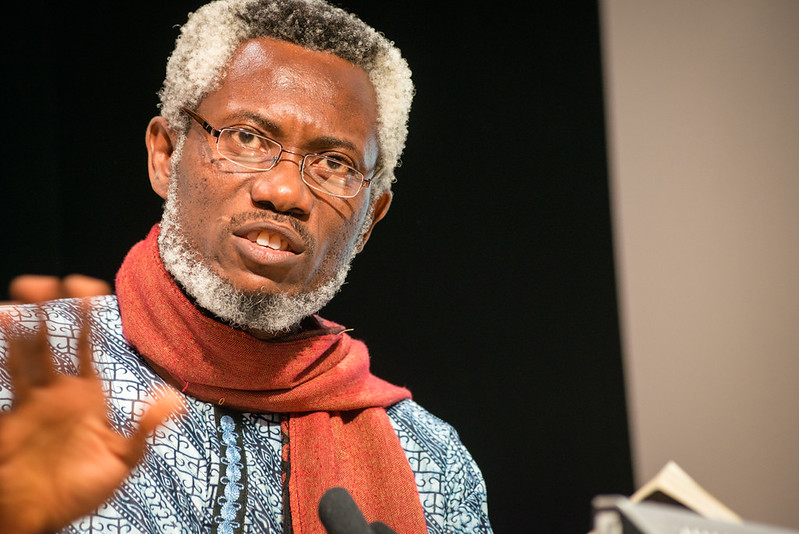
Nigerian author Chuma Nwokolo has accused Nollywood filmmaker Bright Wonder Obasi of appropriating sections of Chuma’s short story without due permission or credit. In a post titled “If I am Plagiarist,” first published on the author’s website and later shared on his Facebook page, the author claimed that multiple quotes from Obasi’s 2018 film If I am President bore “disturbing similarities” to his 2010 short story “Ten Commandments of Nigerian Politics.”
If I am President stars Joke Silva, Enyinnaya Nwigwe, Bimbo Manuel, Ivie Okujaye and Bryan Okwara. It was funded by fourteen entities including the MacArthur Foundation, which supported the film with a $700,000 grant. The Nigerian Police Force was also credited with support for the film. Here is a summary of the film from IMDb:
Set in the present-day political terrain and discourses in Nigeria, If I Am President tells the story of 37-year old Zinachi Ohams, the presidential candidate of the Nigerian Rebirth Party, a new party made up of young idealists and recently metamorphosed from a Civil Society Organization. The group make a push into the murky and rough political terrain, armed with little more than their ideals, and wade through challenges of nasty politically engineered attacks, to emerge as the party and candidate to beat in the elections.
Chuma Nwokolo’s “Ten Commanments of Nigerian Politics” was first published online back in 2010 and reproduced in his 2013 anthology How to Spell Naija in 100 Short Stories Volume 1. The short stories are mostly political satire. Here is a synopsis of the anthology from Amazon:
These short stories are set in the future and the present, in the Diaspora, and in urban and small-town Nigeria, especially in Waterside, the author’s much-visited fictional community. Once again, the author’s sure-handed humour and earthy style brings a cast of characters to unforgettable life. The first of two commemorative volumes of 100 Short Stories by Chuma Nwokolo: a buffet of Nigeriana served with wit and understanding, on the occasion of the centenary of Nigeria’s amalgamation.
Read Chuma Nwokolo’s full statement below:
__________________________________________________________
If I am a Plagiarist
A few days ago, my young friend, Chekwube Nwa-Abugu Peter brought the movie, If I am President, to my attention. He had spoken glowingly of the film on his Facebook timeline. Then he noticed disturbing similarities between the film and my short story, “Ten Commandments of Nigerian Politics.” He feared (he is also a lawyer/writer) that my copyright might have been infringed. I was at the time visiting Accra for the Writers Project of Ghana’s Pa Gya Literary Festival. I am back now, and have taken the time to watch the two-hour film.
He has a point.
As a political thriller, the movie is an eminently watchable story of a young rebellion against Nigeria’s geriatric politics of corruption. There were numerous stirring speeches, mostly from hero and presidential candidate, Zinachi Ohams (played by Ayo Ayola) who plays opposite a distinguished line up of ‘oldies’ led by Elvis (played by Bimbo Manuel). The speeches only get a tad too much during the presidential debates. For the main, the film is a fest of sumptuous cinematography and decent acting from a large cast including winsome child actor, Chimdiya Nwigwe. This is certainly one of Nollywood’s better iterations. It is a shame that when it was first released in October 2018 in the lead-up to the political season, news of the film did not reach my hermitage.
Of course, the film is also a propagandist project that pushes patriotism and young blood as a panacea to our national calamity. In this sense it is nothing more than political, sugar-flavoured, popcorn: it fails to recognise that our entire independence nationalism on the African continent was driven by the same populist fervour of patriotism and young blood. Almost without exception, all that young patriotism across the continent has soured into impunity and aged corruption.
From the get-go, Zinachi’s young team also contained elements just as unscrupulous as the old guard, elements who would in due course morph into an unscrupulous government, if they ever got into power. If we have learned nothing from over fifty years of African politics, across over fifty countries in Africa, we have learned this: the young do not even need to grow old to become corrupt. They only need to pass through the portals of power. It is a shame that mere youth should be rebranded and remarketed like a new, game-changing invention in this film distributed in English, Hausa, Igbo and Yoruba.
A film need not be judged by its inability to proffer sensible political solutions. Unless it markets itself as a sensible political solution.
In the 21st Century, when we choose to write conscience into film, we need concept films that trial and market revolutionary ideas to our people, ideas that can confine even the most corrupt public servants and politicians, young and old alike, into a secretariat of good governance. As I shared with my young participants in a Pa Gya workshop on Writing Conscience into Fiction, which was also taught by my friend Eghosa Imasuen, writers – like politicians – ought first of all, to be thinkers. It is only the product of luminous thought that can be purveyed into revolutionary politics.
Or cinematography.
Which brings me to the suspicion of copyright infringement. Early in the movie, we meet Elvis, a political godfather played by veteran actor, Bimbo Manuel. That introductory scene is cinematographic gold: Elvis interrupts the lynching of a common thief with the military equipment of his commanding voice. He then asks the thief if he had heard of the eleventh commandment. The poor man, who is already wearing his tyre necklace, is clearly unfamiliar with God’s ten commandments and certainly hasn’t heard of an eleventh.
Elvis squats over the petrol-doused thief. He pulls on his glowing cigar. He does not burst into flames, presumably because he wears a powerful secret society amulet that prevents death by petrol fire. Or because the screenwriter needs him alive. Elvis shakes his head. He then rises to his feet and walks towards his Toyota SUV. There, he pauses to light his already-lit cigar, which has apparently lost an inch of its length in the walk to the car.
Then, in a gesture that ushers Elvis into the sanctum sanctorum of the Nollywood Villains’ Hall of Fame, Elvis then throws the cigar over his shoulder. This time, unconstrained by amulets and screenplay immunity, the cigar ignites the petrol fumes and the thief explodes and burns off-camera. Elvis leaves the scene of the lynching in the back of his SUV. His evil laughter is 8 on a scale of 10. Turning away from his driver to address the camera, at the 7.30 mark of the movie, he advises those of us who may be still be interested in joining him in Nigerian politics: “…never hit the big guys, focus on the little people. They are your mugus. They are so powerful, but they don’t know it. That’s why it’s so easy to scam them like the politicians have done for the last 68 years.”
I recognised these words immediately, because they were mine. I first published them online back in 2010 and republished them in my 2013 anthology, How to Spell Naija in 100 Short Stories Vol.1. Now, I turned to page 150 of the book, where, in the short story “Ten Commandments of Nigerian Politics,” Goddy the Godfather gave identical advice: “…never hit the big people. Always focus on the little people, the Naija mugus. Although the little people are much more powerful, they don’t know it. So it is safer to scam them, as politicians have been doing for more than fifty years now.”
Seven minutes and fifty-four seconds into the movie, Elvis continues: “Your job as a politician is to position yourself between that budget and the 180 million people who need it. It’s simple: just build a conduit from the budget to your interest group and to your bedroom. But Nigerians only talk, yeah. Their anger extinguishes in beer parlours… If they ever riot, it is only to kill each other. They never rise against the politicians.”
Mine too. At page 150 of my anthology, Goddy said: “Your job as a politician is to position yourself between that money and the 140 million mugus that own it. You have to build your own conduit pipe from the national budget to your clubhouse. But Nigerians can only talk. Believe you me, their anger finishes at the door of the beer parlour. If they ever riot, it will be to kill themselves. They will never rise against politicians.”
Clearly, any innocent member of the public who stumbles across my book after watching the film would conclude that I had plagiarised If I am President. Especially after hearing Elvis say this, at the 1.03.42 mark of the movie: “When situations start to get out of control and the Naija mugus decide to protest, then you know it is time to pull out a shock therapy, hit them with something that would make all their troubles disappear. How do you make their troubles disappear? Swallow it up with a bigger problem. That’s it. In many countries, fuel scarcity, major fuel scarcity like this can bring down a government. But in Nigeria, it is cement for a weak government. Because the more the naija mugu suffers, the weaker he becomes. I am talking about the kind of fuel scarcity that will make an okada man sleep at a filling station for days just to buy petrol. That kind of scarcity can quench any political protest.”
And comparing it with page 156 of my book, where Goddy the original Godfather lays out the 7th Commandment: “Sometimes during a national crisis, it seems as if the situation is getting out of control; that is the time to pull out a shock therapy. If the street protests are getting too much, a good way to checkmate them is to hit them with something that makes all their troubles disappear – and the best way of making a problem disappear is to swallow it up with a bigger problem.In many countries, a serious fuel shortage can bring down a government. In Nigeria, it is cement for weak governments, because the more Naija mugus suffer, the meeker they become. I am talking about the kind of fuel shortage where okadas sleep four days in petrol stations to buy fuel. That type of fuel shortage can quench any political protest.”
The infringement only got worse. At the 1.05.12 mark of the, Elvis declares: “Yeah, start abusing yourself in the newspapers… As you are play-fighting in the press, so will the naija mugus be fighting each other on the streets for real.”
Words which were copied from page 157 of my book:”You must start abusing yourself in the papers…As you play-fight in the newspapers, that is how the Naija mugus on the street will be fighting themselves for real.”
At 1.05.17, Elvis says: “If the budget provides for 5,000 new jobs, you provide 500 jobs, eat the rest of the money. In the midst of all that confusion you carry on with your own agenda. Before the mugus know what is happening, another budget would have finished.”
Of course he was only reading from page 157 of my book:”If the budget provides for 5,000 new jobs, create 500, chop the rest of the money… In the middle of all the confusion, continue your own agenda. Before the mugus know what is happening, another budget would have been finished.”
It is ironic, of course, for a project that takes the high moral ground on political corruption to hog the gutter so gratuitously on the path to celluloid. For several years, I have written about the normalisation of plagiarism and intellectual fraud in the ‘As Copied’ pandemic enabled by social media, which seems to place an irresistible burden on us to say something startlingly brilliant every morning, without diffusing the glory of the words by appropriately crediting their original creators. Inexplicably, this pandemic seems to have infected the collegiate film industry, which ought to have fewer bones about collaborative work where the eventual quality of a film amply justifies shared credit.
It is telling that wherever Elvis utters Goddy the Godfather’s words, he pivots out of character to address the camera and the viewers directly. No other character in the film does this, and Elvis himself does not do this anywhere else in the movie. This speaking to the reader/viewer mirrors the tone and structure of Goddy’s language in my short story, “The Ten Commandments of Nigerian Politics.” Elvis could easily have addressed his words to his driver, who is present during all his ‘Goddy the Godfather scenes’. Unfortunately, the surreptitiously wolfed Commandments of Goddy the Godfather were not sufficiently digested by the movie character, resulting in a split personality Elvis who eventually asks his viewers, jocularly, to send him a bank transfer for his stolen advice.
At the end of the two hour-movie, I naturally made a granular review of the credits. The film is “written and directed” by Bright Wonder Obasi, who is also the producer. Over seven hundred extras from the many crowd scenes were scrupulously credited by name for their creative work on the film. Fourteen entities were appreciated and credited by name, including the MacArthur Foundation, which laid on a $700,000 grant that benefited the film. The Nigeria Police Force was also appreciated and credited by name, presumably for not prosecuting anyone for egregious infringement of copyright. Line Producer, Uzee Usman, was even credited twice over for his role as the character, Bankole. Yet, although close to ten percent of my short story “Ten Commandments of Nigerian Politics” was quoted in the movie, neither my name nor my story received a mention. Instead, the movie and the credits end with the card “A High Definition Film Studio Production © 2018,” thereby concluding the well-funded, sleekly orchestrated, appropriation of my intellectual property.
In my short story, Goddy the Godfather issues the following threat (which clearly did not dissuade our screenplay writer) in an effort to keep his Ten Commandments secret: “This manual has been written only for the eyes of The Maitama Club. If you are not a member, please stop reading now. It is by reading things that don’t concern them that many men have lost their manhoods. You have been warned.”
As Goddy’s creator, I assure members of the male gender that it is safe to read the story. Unless they have plagiarist intentions. It is also safe to watch the film. If you haven’t already, do take in If I am President before court injunctions kick in. Although it offers no new ideas to transform Nigeria, it does offer inspiration to do so.
And those behind the film might need the money to compensate me.









PEARL OSIBU November 06, 2019 02:55
I made this comment under a self-serving IG post this Bright Wonder made on his birthday, two days AFTER Chuma made these callegations. And like the coward he is, he deleted the comments and left all the ass-licking comments telling him how great he is. As though he thinks this will make these claims disappear. What a dishonest person. Here is the comment: "Nice speech. But go and settle with Mr. Chuma Nwokolo for his work that you stole. Whatever you're saying here, whatever moralizing you're doing and where ever you're doing it is utterly meaningless, dishonest and hypocritical until you explain why you so blatantly and brashly made free (euphemism much?) with the blood and sweat of another creative. Your fans and supporters will not help you. You'd better find out who Chuma is. You will not be allowed to play ostrich, sweep this under the rug or play victim. The funny thing is that Chuma would have let you use pieces of his work - WHOLE PIECES - for next to nothing. But you had to behave like the worst example of a 'creative'. "